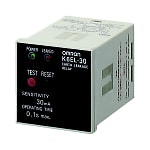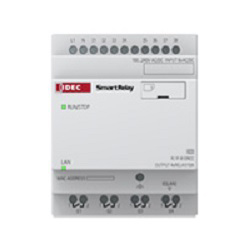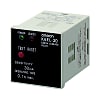(!)NOTE : Windows 7 users won’t be able to use some latest features of eCatalog/WOS since Microsoft is ending support for Windows 7 on 14 Jan, 2020. Please upgrade your system for uninterrupted services.
- Please note that the MISUMI Pune office and warehouse will be closed on November 20th due to the state election.
- Notice of End of Sales for Economy Series Pneumatic Equipment Category. More information.
Controllers(Type:Smart Relay)
Brand |
|
|---|---|
| CAD |
|
| Days to Ship |
|
2 items
- Sort By
-
You can add up to 6 items per a category to the compare list.

OMRON
Electrical leakage relay K6EL
[Features]
· Constantly monitors and detects electrical leakages caused by insulation degradation of electrical equipment in low voltage circuits.
· Realizes high reliability that enhances high-frequency noise resistance characteristics that support inverter loads.
· Compatible with electrical leakage relays and through-type zero-phase current transformers (ZCT).
· The ZCT through-type comes with a test terminal and enables electrical leakage relay operation testing to be carried out easily.Type Smart Relay From: ₹ 8,207.20 Days to Ship: 5 Day(s) or more  5 Day(s) or more
5 Day(s) or more
-
You can add up to 6 items per a category to the compare list.

IDEC
[Specifications]·FL1F type that pursues user-friendliness while achieving both easiness and high functionality.
Type Smart Relay From: ₹ 15,675.66 Days to Ship: 6 Day(s) or more  6 Day(s) or more
6 Day(s) or more
| Brand |
|---|
| Product Series |
| From |
| Days to Ship |
| Type |
You can add up to 6 items per a category to the compare list. | You can add up to 6 items per a category to the compare list. | |
| Brand | OMRON | IDEC |
| Product Series | ||
| From | ₹ 8,207.20 | ₹ 15,675.66 |
| Days to Ship | 5 Day(s) or more | 6 Day(s) or more |
| Type | Smart Relay | Smart Relay |
Loading...
Related Categories to Controllers
FAQ Controllers
- Question: What is the role of a controller in industrial automation and what types are commonly used?
- Answer: A controller in industrial automation acts as the brain of machinery, overseeing and directing operations. Common types include Programmable Logic Controllers (PLCs) for discrete control and Distributed Control Systems (DCS) for process control. These controllers interpret data, make decisions, and execute commands to ensure the efficiency of automated processes.
- Question: How do industrial control systems enhance the efficiency and safety of machinery operations?
- Answer: Industrial control systems enhance efficiency by automating and optimizing processes, reducing manual intervention. They also improve safety by providing real-time monitoring, early fault detection, and the ability to implement emergency shutdowns, minimizing risks in industrial environments.
- Question: What are the primary components of an industrial control system and how do they interact?
- Answer: The primary components include sensors to gather data, controllers to process information, and actuators to execute commands. These components interact by creating a feedback loop: sensors send data to controllers, which make decisions and send commands to actuators, influencing the system's behavior.
- Question: Why is cyber security important in industrial controls, and what measures can be taken to enhance it?
- Answer: Cybersecurity is crucial to prevent unauthorized access and protect against cyber threats. Measures include network segmentation, regular software updates, strong access controls, and employee training to ensure a robust defense against potential cyber attacks.
- Question: How do PLCs function within industrial control systems, and what makes them essential?
- Answer: PLCs are specialized controllers that automate industrial processes. They receive input from sensors, process data using programmed logic, and send commands to actuators. Their reliability, programmability, and ability to withstand harsh industrial environments make them essential for precise and efficient control.
- Question: What advancements in remote access technology are impacting industrial control systems (ICS) today?
- Answer: Advancements in remote access technology, such as cloud-based systems and the Industrial Internet of Things (IIoT), enable real-time monitoring and control from anywhere. This enhances flexibility, efficiency, and predictive maintenance capabilities, transforming the landscape of industrial control systems.








How can we improve?
How can we improve?
Thank you for your time.
Your feedback is essential for our continuous improvement
Privacy Policy
Thank you for your cooperation.
Thank you for your time.
Your feedback is essential for our continuous improvement
Please use the inquiry form.
Privacy Policy